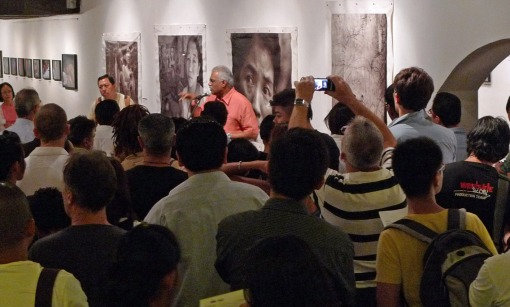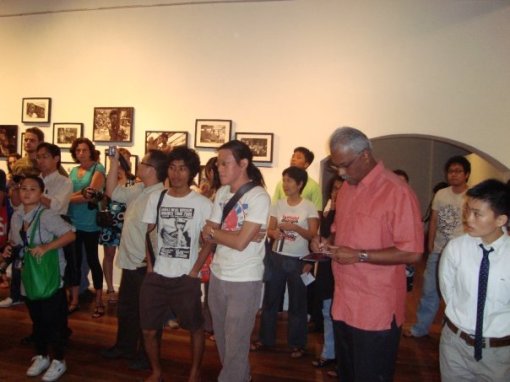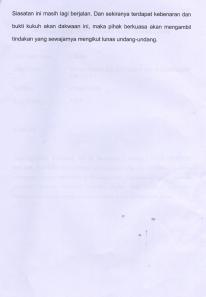Source :- Free Malaysia Today
September 5, 2011
Refugees in Malaysia want to escape to Australia as Malaysia is a hell-hole for them. Here they face persecution, torture and detention, says Charles Santiago.
Now that the mysterious froth covering the refugee swap deal has bubbled over, we have both the Malaysian and Australian governments cracking their heads to work around Australia’s High Court decision which ruled the deal illegal.
In a move that would leave hundreds of boatpeople in a limbo, Australia had hoped to send 800 asylum seekers to Malaysia in exchange for re-settling 4,000 of its refugees over the next four years.
And under the deal wrapped by Immigration Minister Chris Bowen and Home Minister Hishammuddin Hussein, Malaysia would be paid a cool $290 million Aussie dollars as processing and relocation fees.
The judged ruled that under Australia’s Migration Act, the government could not send asylum seekers to be processed in a country unless the country is compelled to offer adequate protection.
A summary of the court judgment said that “the country must be legally bound by international law or its own domestic law to provide protection for asylum seekers pending determination of their refugee status. In addition to these criteria, the Migration Act requires that the country meet certain human rights standards in providing that protection”.
This is definitely a slap on Malaysia’s face. And it came on Merdeka Day.
So now it’s clear that the Australian High Court thinks Malaysia is an unsafe destination for refugees. This is definitely not a pretty picture for the country.
But again why would the court ruling be otherwise? The Umno-led coalition government is yet to ratify the 1951 UN Refugee Convention or the UN Convention Against Torture.
According to Amnesty International more than 6,000 refugees are caned every year and Malaysia is a reluctant host to 100,000 refugees. The Barisan Nasional government is not even prepared to accommodate 17,000 refugee kids in schools.
Non-ratification of the Convention also means the status of asylum seekers and refugees are not recognized by the government. This extends to the police, Rela and the immigration.
Asylum seekers processed by the United Nations High Commissioner for Refugees (UNHCR) would be given identification cards. The Kuala Lumpur government does not give a toss about this identification.
Refugees continue to be hunted down by the immigration officers and Rela, forcing them to do odd jobs on the quiet for paltry wages. They live sandwiched in tiny rooms and usually in jungles to avoid being nabbed and are at times sold to human traffickers by the immigration and Rela officers.
To nip human trafficking?
Malaysia has not uttered a word about the possibility of recognizing the asylum seekers, not even the 800 who would have been sent over forcefully by Australia if the deal had gone through.
While the court decision caricatures Malaysia’s appalling treatment of its refugees, it has also left Australian Prime Minister Julia Gillard’s image in tatters. Gillard, who leads the nation with a mere one-seat majority, is at the risk of losing her top job.
Officials from both countries were in Kuala Lumpur late July to ink the memorandum of understanding to push for the refugee transfer program. It was packaged to demonstrate that the deal would nip human trafficking in the bud.
This is highly illogical and illustrates the foolishness of both countries. Refugees in Malaysia want to escape to Australia as Malaysia is a hell-hole for them. I am not mincing my words. Here they face persecution, torture and detention.
Australia, a nation which has ratified the convention, shamelessly indulged in a criminal act by attempting to send the boat people to Malaysia.
Malaysia would continue to attract refugees who are fleeing their home lands fearing persecution. These people could come from Burma, Sri Lanka, Somalia, Palestine or Afghanistan.
Signing deals with governments to trade refugees would not work. A durable Malaysian solution must start with the government ratifying the 1951 UN Refugee Convention.
Anything which falls short of this would only spell disaster for Malaysia’s already-crumbling human rights record.
Charles Santigo is DAP’s Klang MP.








 The exhibition will last until the Oct 25.
The exhibition will last until the Oct 25. “In the report, refugees who are now residing in the US, and who once lived in Malaysia, were interviewed and they have one thing in common. All of them have been sold,” he told a crowd of 60 people.
“In the report, refugees who are now residing in the US, and who once lived in Malaysia, were interviewed and they have one thing in common. All of them have been sold,” he told a crowd of 60 people. However, Santiago (right) credited the government for taking some action to arrest traffickers in the last couple of months.
However, Santiago (right) credited the government for taking some action to arrest traffickers in the last couple of months. The audience were also treated to a performance by two Burmese musicians.
The audience were also treated to a performance by two Burmese musicians. Suaram is expecting to collect at least 10,000 signatures from Malaysians by May 21, 2010 to be submitted to Prime Minister Najib Abdul Razak.
Suaram is expecting to collect at least 10,000 signatures from Malaysians by May 21, 2010 to be submitted to Prime Minister Najib Abdul Razak. Refugees, adults and children alike, are instead treated as ‘illegal immigrants’ and are subjected to harsh penalties, detention and deportation under the Immigration Act.
Refugees, adults and children alike, are instead treated as ‘illegal immigrants’ and are subjected to harsh penalties, detention and deportation under the Immigration Act.





 “Where did these foreigners get their information? They assume that they know more than we do.
“Where did these foreigners get their information? They assume that they know more than we do. 